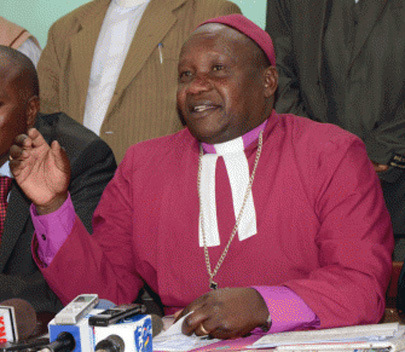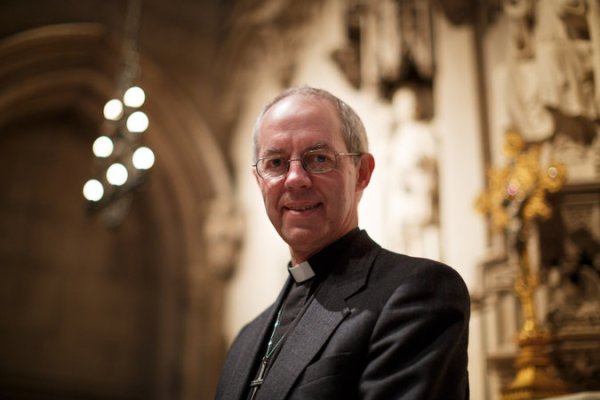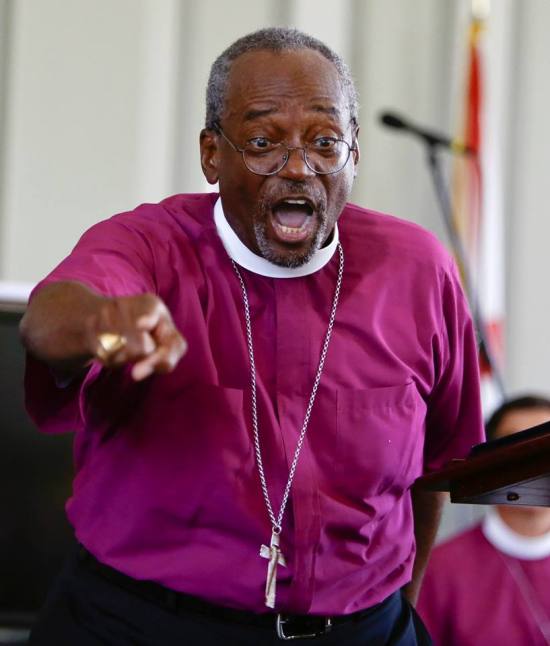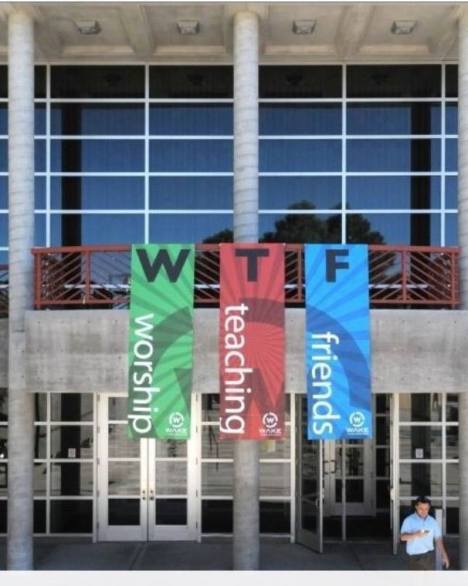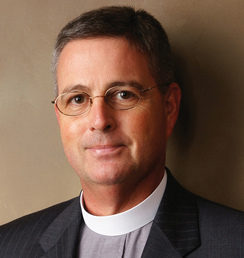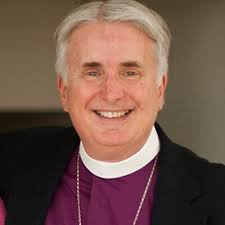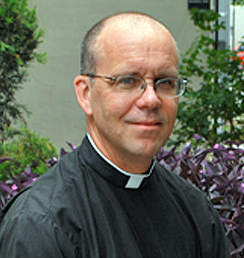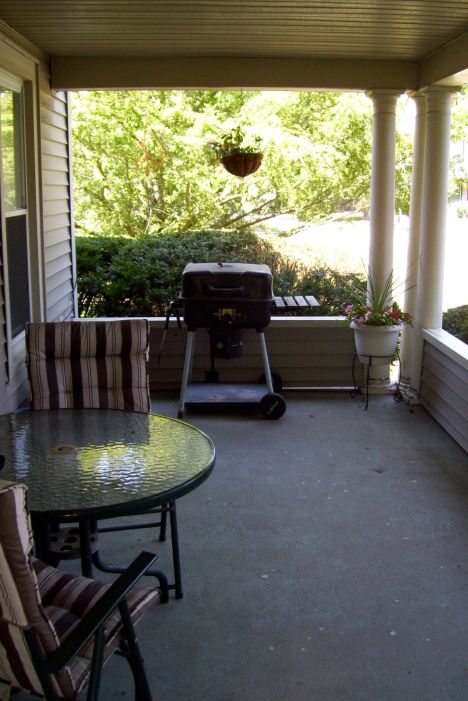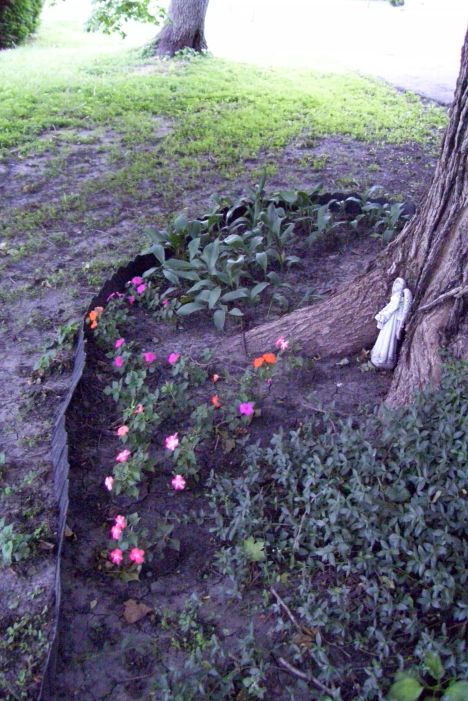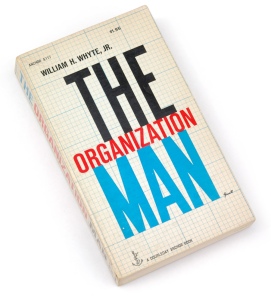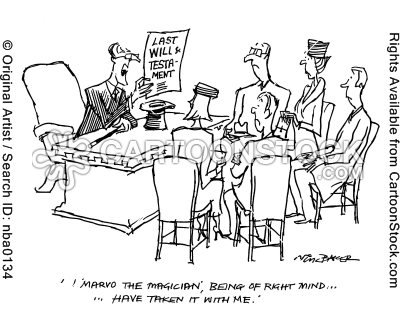
This morning on Twitter I discovered that someone was trying to steal credit for the most distinctive phrase in the 1979 Book of Common Prayer.
It was an honest mistake and it’s since been corrected. But it was in an article by the official Episcopal News Service, and I couldn’t let it stand.
Howard E. Galley, Jr. wrote Eucharistic Prayer C late one night in 1974, upon returning to his office at the Episcopal Church Center (“815”) after leading an evening group for Church Army trainees at the General Theological Seminary in New York. I was one of his students in that yearlong training course. After graduation and a lengthy internship, we were commissioned as Evangelists with a national preaching license.
It was a busy year for Howard; a satisfying and productive year. His main job was shepherding an entirely new version of the American Prayer Book. The English version of the BCP, first published in 1549 shortly after the death of King Henry VIII, is a classic of English literature which has guided the worship and nourished the souls of Anglicans worldwide for centuries. The original Book has only two equals: the Authorized King James Version of the Bible and the collected works of William Shakespeare.

God faue the Kyng, indeed.
Howard Galley was up to the task.
His job title at Church headquarters was “Assistant to the Coordinator for Prayer Book Revision.” The coordinator was a diplomat, priest-scholar and liturgist named Fr. Leo Malania, whose day job was serving on the faculty of the Mercer School of Theology in the Diocese of Long Island, New York.
What this meant in practical terms was that Leo had a big clean office at “815,” where he showed up occasionally when the Standing Liturgical Commission had a meeting. As his assistant, Howard Galley did all the day-to-day work, in a smaller office piled with papers, charts, journals, magazines, correpondence, books and workbooks and notebooks.
Leo was the star; Howard wrote the script. Leo would breeze in from Long Island, shoot his scenes, and leave. By all accounts he was a great actor in this lengthy production, from roughly 1968 to 1980. It was the most important work in the Episcopal Church during the 1970s, and no one could have led it but him. He was a former assistant to the Secretary-General of the United Nations and a renowned liturgical expert with international contacts at the highest levels of scholarship in the Vatican, the World Council of Churches, Orthodoxy and other top church bodies. His was the name that ultimately carried the day.
But the actual coordinator was Howard.
So imagine how plucked I was to discover this ENS article today, attributing Howard’s finest writing to some retired bishop named Atkinson at a church in Virginia. I never heard of this guy before, but I was not surprised to see someone else credited for Howard’s seminal work.
I fired off a tweet when I saw the article, and soon was contacted by the ENS reporter, Lynette Wilson. She told me she had based her article, which is about stewardship of the Earth, on something she was told concerning the authorship by someone at that church in Virginia. Apparently this Bishop Atkinson was so taken by Howard’s phrasing of Eucharistic Prayer C and the theology embedded in it, and spoke of it so often, that in time local people started attributing the prayer to him. The bishop must have been a wonderful teacher.
But he did not write that prayer. Howard did, after one particularly good night at the National Institute for Lay Training at General Seminary, which he served as dean.
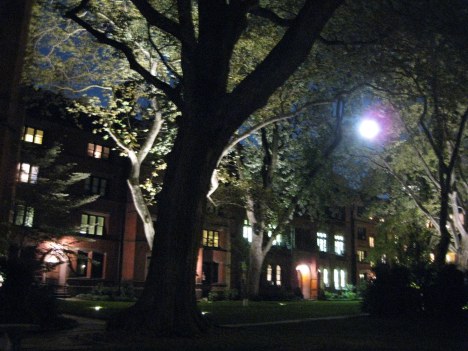
The Close at night, by the Rev. K. Jeanne Person.
As one of his trainees I was present with about 10 other people, the first time Mass was celebrated a few days later using Howard’s revolutionary new prayer. When worship was done, we were in awe of what he had written and asked him lots of questions about it. All we knew beforehand was that the Rev. Bill Coulter, another NILT faculty member and the only priest, would celebrate using a new prayer; then out tumbled this fabulous new thing with so many features – including responses from the congregation – that had never been done before in Christian history.
Howard was kind of shy about it, but he told us when and how it came to be. He even attributed our good group meeting a few nights earlier as his inspiration. He’d sat in his office at “815,” looked out the window and saw a big, beautiful moon over the city. Five years earlier, Neil Armstrong and Buzz Aldrin had first set foot on that moon – an epochal event in human history.
In 1969, in living rooms across America and around the world, we watched live television coverage from the moon, and everyone saw for themselves that we live on “this fragile Earth, our island home.”
Howard consecrated that moment five years later and claimed it for God.
—
I could say much more about that year in my life and Howard Galley’s place in it, and someday perhaps I will. Now, however, I just want to get down these basic facts. Because I don’t ever want to see again, in a publication of the Episcopal Church or anywhere else, one more false claim about the authorship of Prayer C.
I know of two other living witnesses to this account: the Rev. Anthony Guillen, Hispanic/Latino Missioner of the Episcopal Church, who like me was a Church Army trainee that night; and Patti O’Kane, the longtime partner of Howard Galley’s best friend and associate, Sr. Brooke Bushong, also of the Church Army, who later became a deacon in the Diocese of New York.
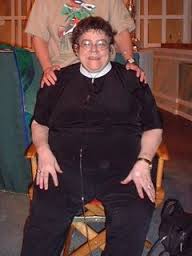
The Rev. Sr. Brooke Bushong, late of the Church Army.
Much of the background here, including the misattribution of authorship, is due to the low status of lay ministers in the Episcopal Church. The Standing Liturgical Commission would never have hired Howard Galley as coordinator of Prayer Book Revision; that important post had to go to a member of the clergy – because no one who was not ordained was considered capable or legitimate. This is the “Bishops’ Church,” after all; that’s what “episcopal” means. Prestige is the sole province of clergy in this church (and in most others), with one result being collateral damage to Howard Galley’s essential contribution in compiling that revolutionary Book.
I’m not interested in sour grapes; this is just a fact of life. But I will not allow Howard’s name to be forgotten or his contributions to be trashed, especially by people who don’t know what they’re talking about.
I am apparently the Last Man Standing among the old Church Army crowd. So I have an obligation to my friend and to other lay ministers to set the record straight and preserve Howard’s legacy.
He was quite a character; by far the best teacher I’ve ever had, and that includes some really good ones, especially Sr. Brooke and Fr. Bill. The fourth member of the NILT quartet was Capt. Tom Tull, a former missionary in Alaska who was “young and dumb” in 1974. Tom came into his own years later as an AIDS activist and minister in San Francisco. We all had that in common, frankly, but that’s another story.
If Leo Malania was a movie star, Howard Galley was a headliner on Broadway. I’ve never seen a human being hold a crowd’s attention like Howard could, night after night, anywhere but a Broadway theater. He was electrifying; loving, gentle, incredibly smart, faithful down to his bones. And he was also, by age 45 or so when I first met him, the very picture of a divo.

Mick Jagger
That’s Italian for “a god.” But unlike a rock star or Broadway headliner, Howard wrote all his own material and gave a different performance every night.
That’s just what teachers do. But even the best ones aren’t enthralling every time out like he was.
We all think we know what female divas are about, in opera or the theater; lots of ego, massive self-centeredness, ordering people around. That’s the popular stereotype, but the actual goddesses of the theater – Bernadette Peters, Ethel Merman, Chita Rivera, Angela Lansbury, maybe Irina Menzel – are spellbinding.
They don’t stop the show; the audience stops the show to go nuts over them. They say Merman held the last note of “I Got Rhythm” for 32 bars without a breath; of course the audience rioted!

Merman was an Episcopalian; I wouldn’t be surprised if she gave Howard lessons.
But Howard was a man. I compare him to Jason Robards in Moon for the Misbegotten by Eugene O’Neill, which was playing at the Morosco Theatre that year, with its long stretches of monologue for the two protagonists. (Colleen Dewhurst was every bit as strong as Robards, her ex-husband; if anything she stole the show because her character starts out at a disadvantage to her drunken, eloquent, loudmouth bellower of a man.)
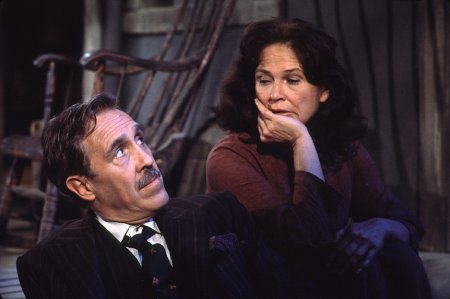
Every night with Howard was like going to Broadway. There I was, a 22-year-old hick from the sticks, staring open-mouthed at this teacher who was so thrilling and demanding, vulnerable and full of faith.
(If this reminds you of anyone you know, please don’t mention it until after the webcast.)
Now I will end this, by reprinting the three comments I left on the Episcopal News Service website this morning. I’m trying to set the record straight and create a larger internet presence for my great teacher, who died in 1993. I can’t find a single photograph of Howard anywhere online, so this will have to do.
He was a great man. So let me add right now, if anyone from that era deserves a place on our liturgical calendar in future years, it won’t be Leo Malania or any of the thousands of others who contributed to prayer book revision. It will be Howard Galley, a devout Catholic who was a thorough Evangelist.++
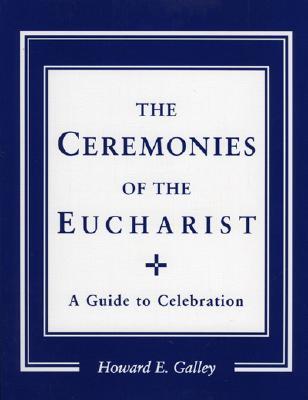
___
Comment #1 on Episcopal News Service’s website:
Howard E. Galley, Jr. of the Church Army wrote those words, not Bishop Atkinson. I was present the first time they were used to consecrate bread and wine at the Eucharist, in a classroom at General Seminary, New York, in the summer of 1974. The Rev. Bill Coulter celebrated for my Church Army training class; Capt. Galley, Sr. Brooke Bushong and Capt. Tom Tull were there along with six lay ministry students, including Anthony Guillen, who was later ordained and became Hispanic/Latino Missioner at 815. Howard told us after Mass how he came to write that prayer, late one night at 815 after one of our evening classes. He wrote it all in one sitting, then refined it with Brooke and a few other friends a few nights later at a bar in Brooklyn Heights.
He was Assistant to the Coordinator for Prayer Book Revision and General Editor of the new BCP, the day-to-day staffer who kept the wheels turning for the Standing Liturgical Commission in the runup to the General Convention of 1976, at which the Draft Prayer Book was provisionally approved for three years before winning final approval in 1979. Howard Galley wrote that prayer and no one else.
On his behalf I respectfully request a correction.
___
Comment #2:
What Bishop Atkinson must have done was to quote Howard Galley’s phrase (and perhaps celebrate Mass using it) so often at Emmanuel, Greenwood, that in time people began to think he must have written it.
Besides Fr. Guillen, I have another witness who was present during the creation of this prayer: Sr. Brooke Bushong’s partner Patti O’Kane, who still lives in Brooklyn Heights and can supply details about Howard, Brooke and others meeting for a drink a few nights after he composed the prayer. He read it to them, and they were the first persons to ever hear it; he asked for feedback and they gave him some. A few days later Fr. Bill Coulter gave it its world premiere in a little room at GTS.
___
Comment #3:
Historical footnote, for the record: Howard knew within a couple of weeks that “this fragile earth, our island home” was a hit; Neil Armstrong and Buzz Aldrin had landed on the moon only five years earlier. And Howard knew that the environmental theme also resonated quickly; the first Earth Day happened in 1970. But the thing he was proudest of in that prayer was that it’s the first in Anglican history to invoke the Blessed Virgin Mary as part of the consecration.
By far his proudest moment in the overall, decades-long process of Prayer Book revision was winning final approval for the most important provision of all: the rubric on p. 13 terming the Holy Eucharist “the principal act of Christian worship on the Lord’s Day.” For the first time since the Reformation, Sunday Mass was restored to its rightful place in Anglican worship.
This Church owes Howard Galley and everyone associated with Prayer Book revision the highest honor we can bestow. People think that what the ’79 Book did was get rid of “thees and thous,” but that was the least of it. The Commission, Bishops and Deputies gave us back our Communion with Christ, and we must never forget what they did. This Book made history because it made us Catholic again, in practice as well as thought.
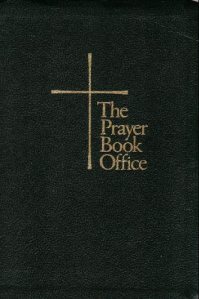
So now you know.
Filed under: Christian, Church of England, Daily Office, environment, Episcopal Church, prayer | 22 Comments »



